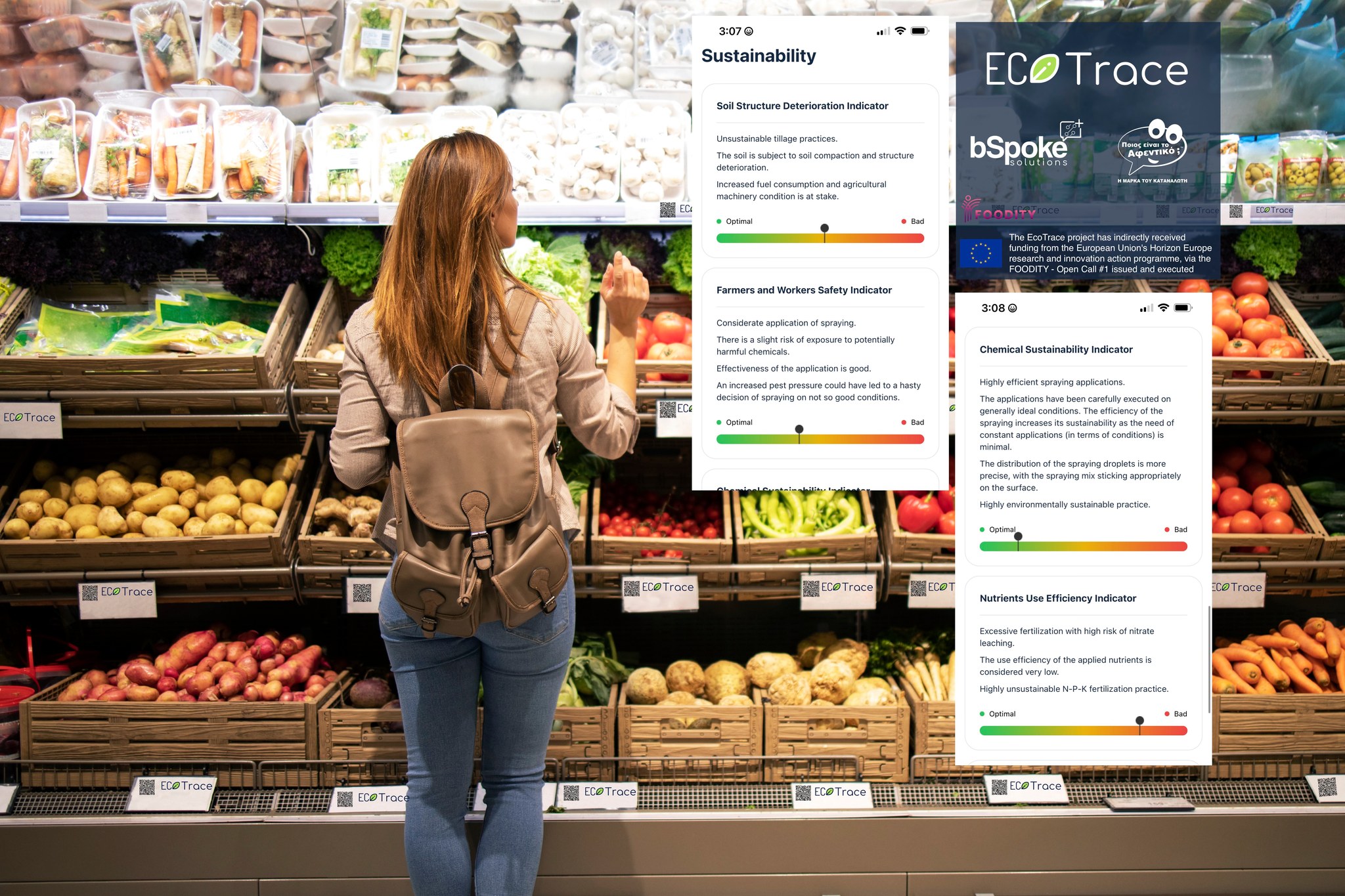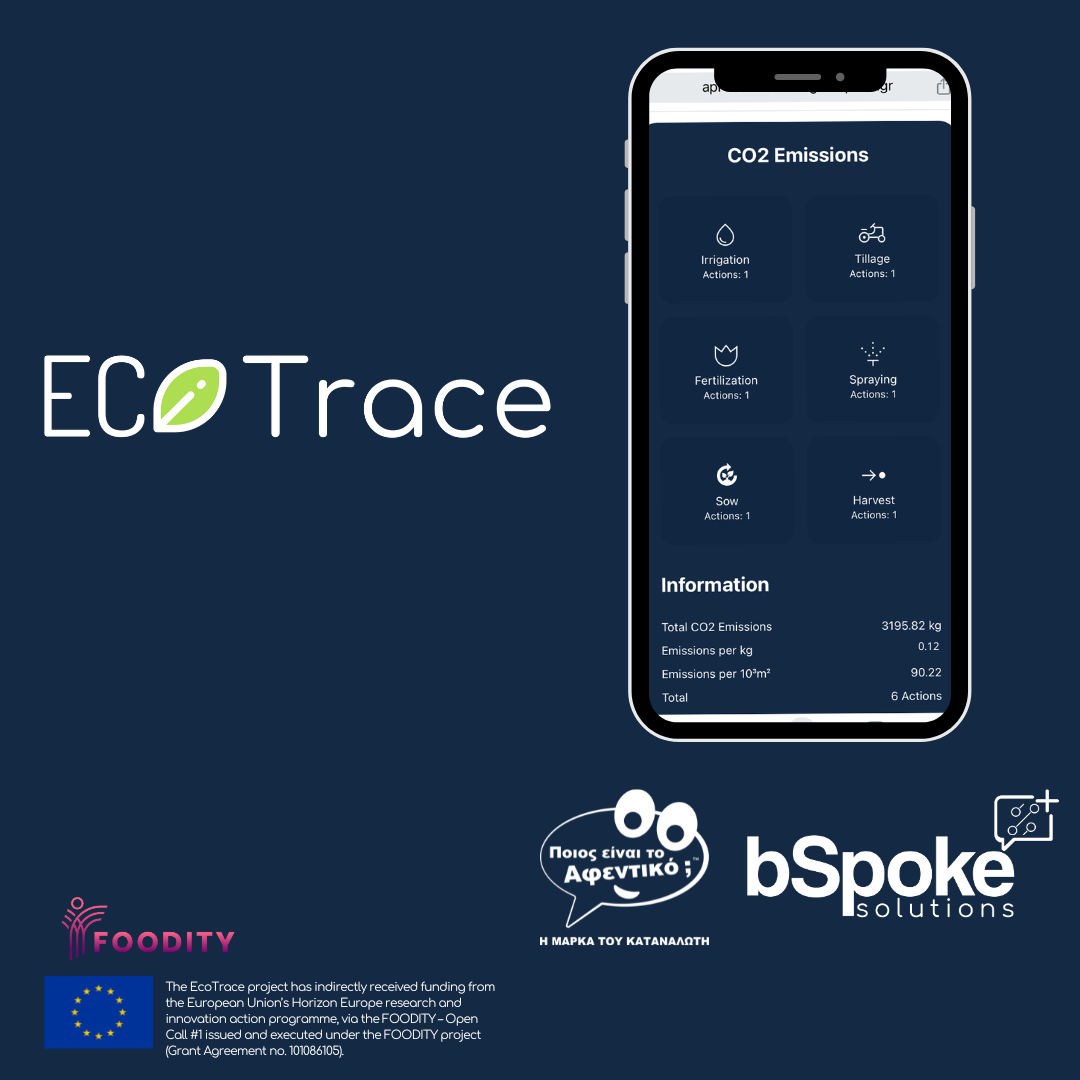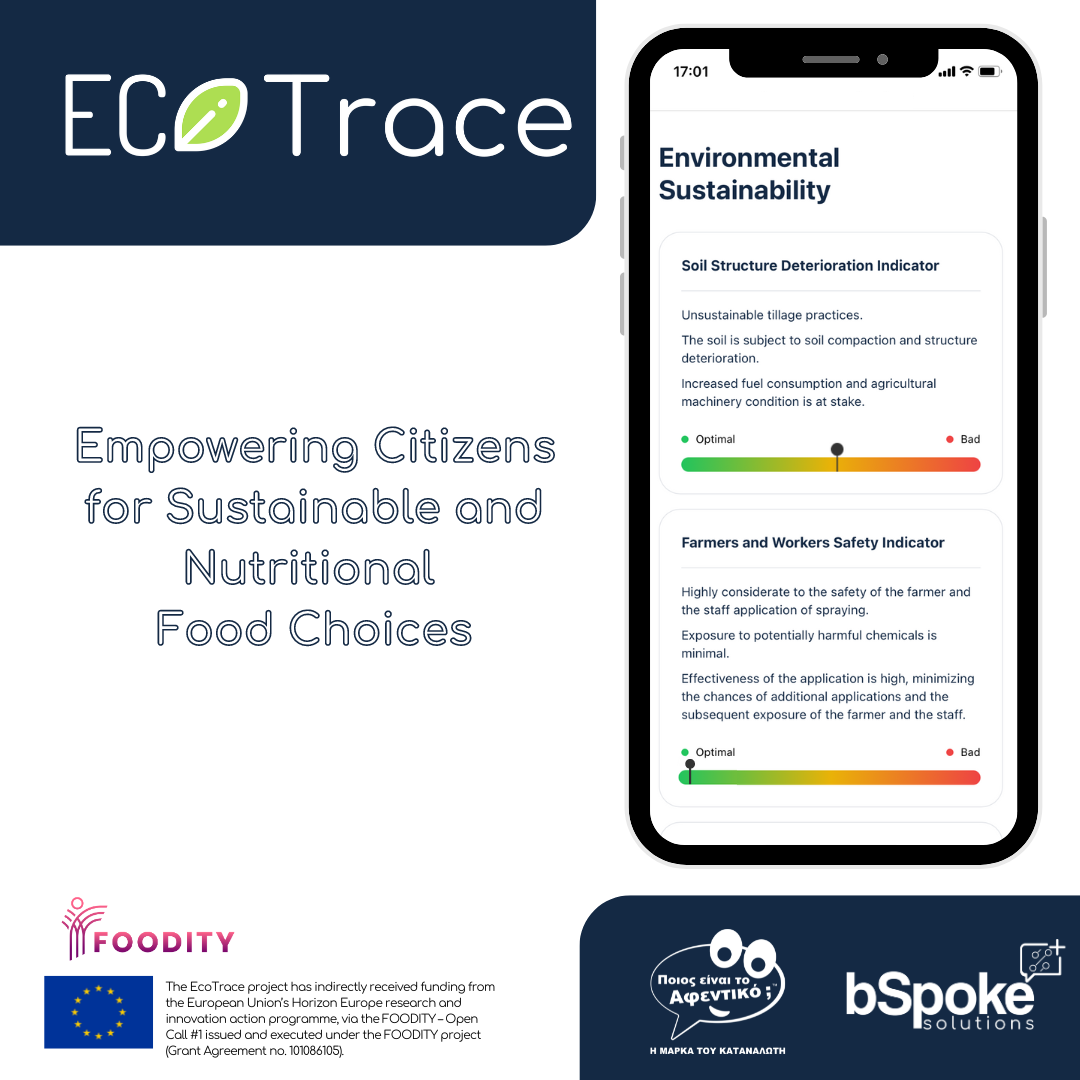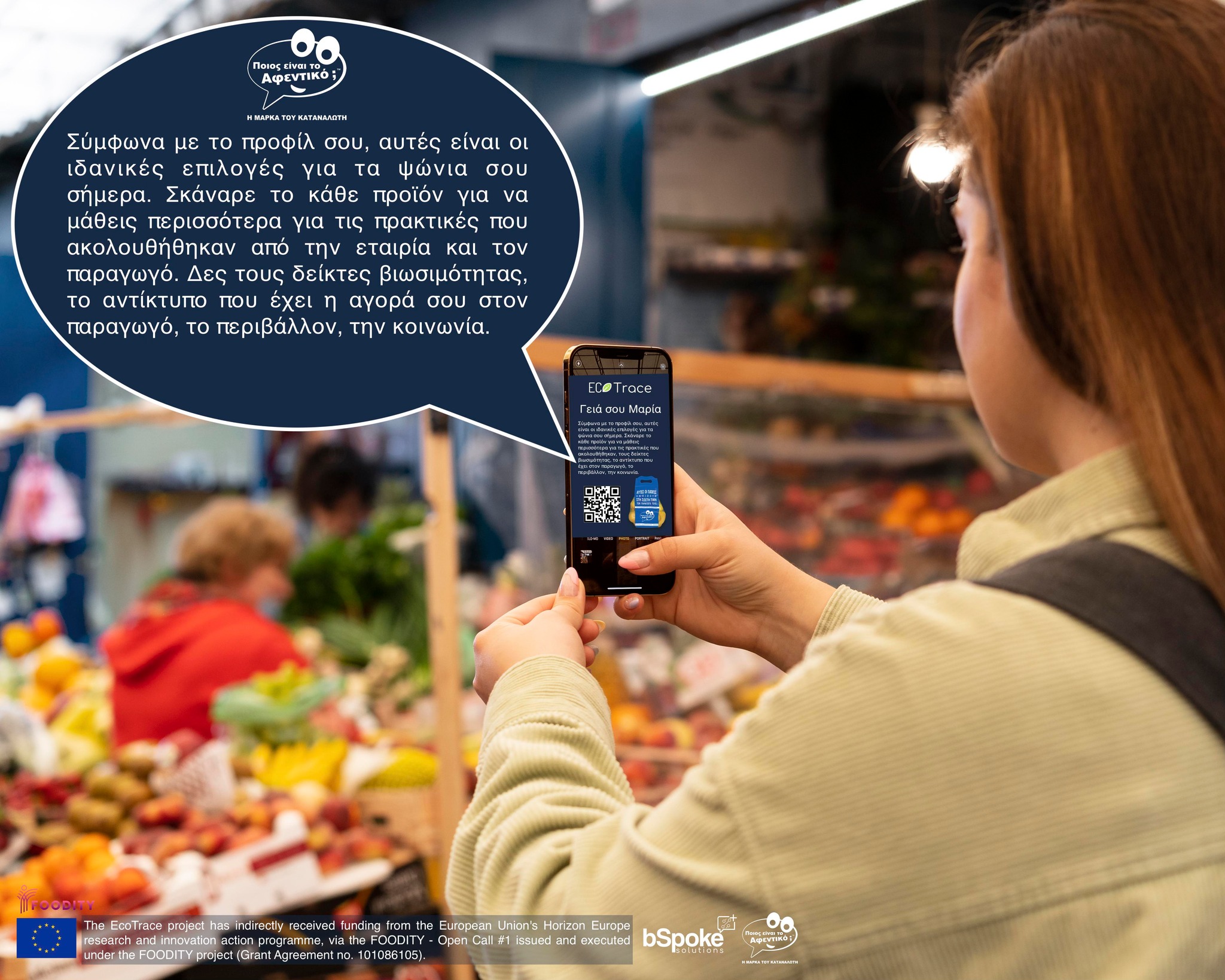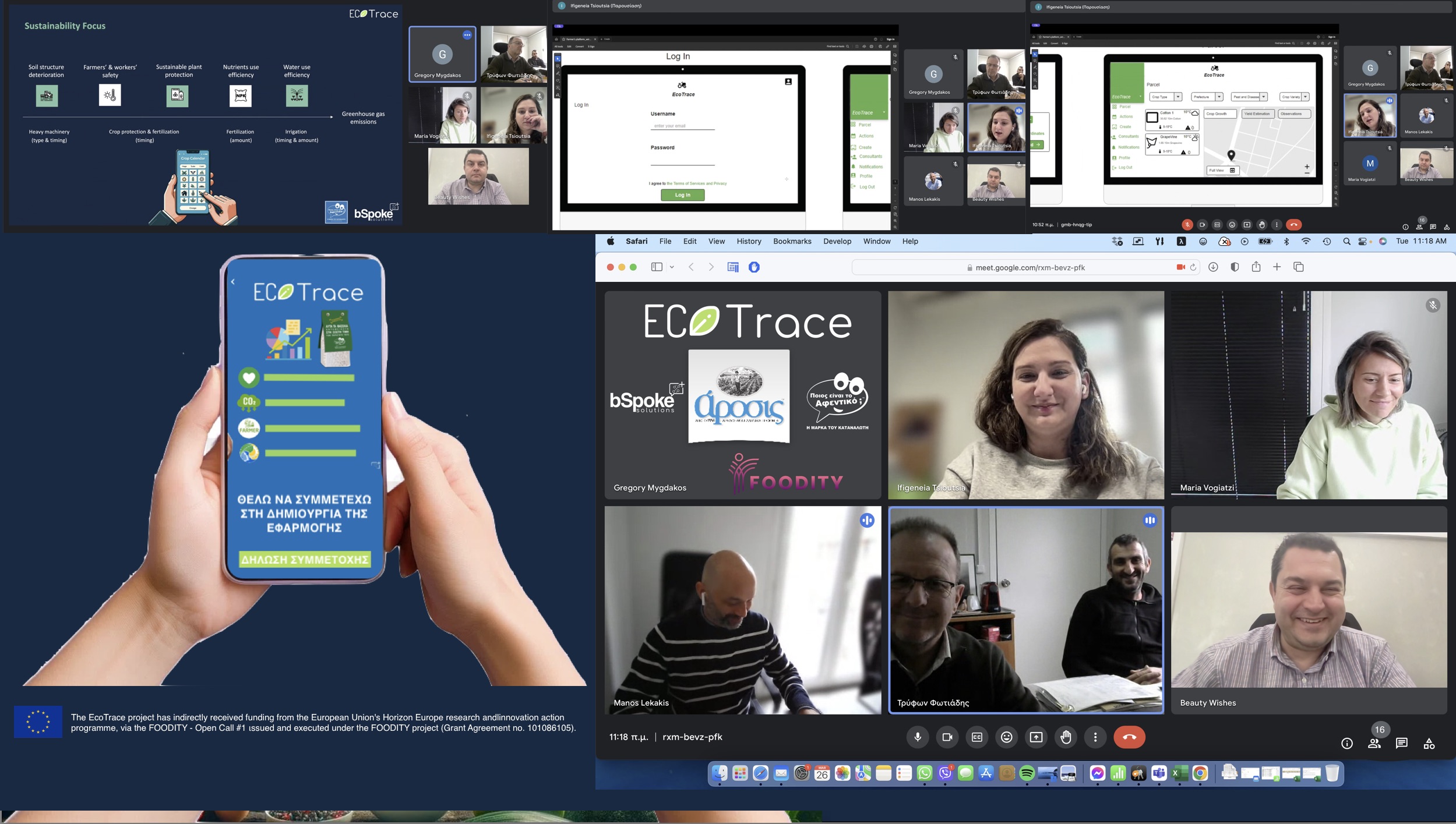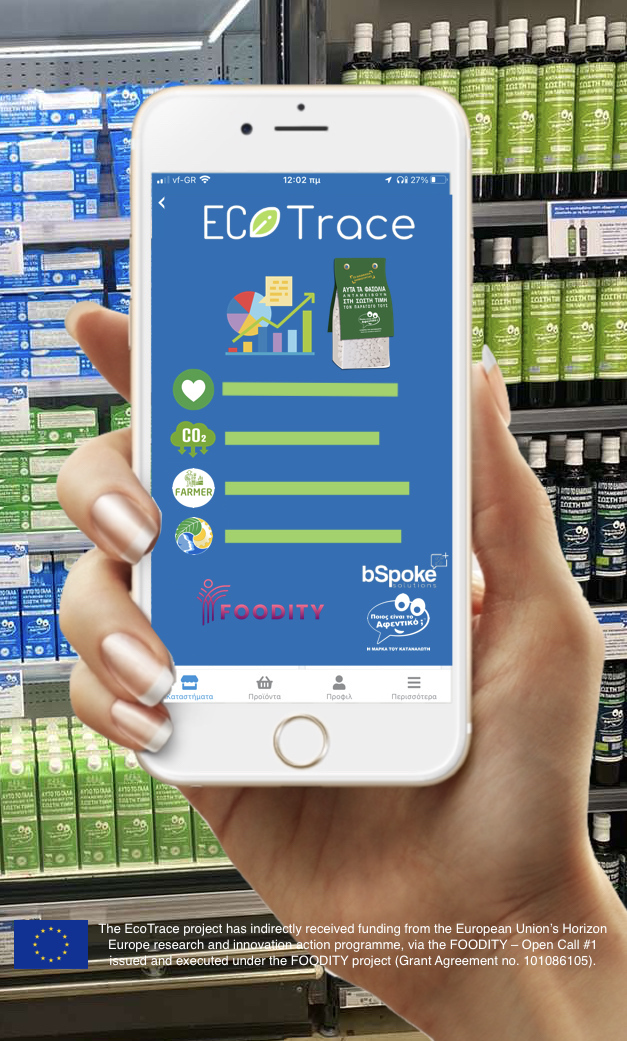EcoTrace
Empowering Citizens for Sustainable and Nutritional Food Choices
Overview
The Challenge
EcoTrace is developed in response to the pressing challenges surrounding food sustainability, data sovereignty and privacy. It aims to empower individuals with knowledge and tools to make informed decisions about their food choices, contributing to more sustainable and healthier food systems.
Users/Testers
20 users/testers
The solution
EcoTrace is a data-driven mobile application that enables users to make sustainable and nutritionally informed food choices through a blend of integrated data systems and smart analytics.
At its core is a Nutrition Ontology, which classifies food items based on nutritional value and environmental impact by aggregating information from food suppliers, sustainability indicators and nutritional databases. This structured approach ensures that the recommendations users receive are both health-conscious and environmentally responsible.
The application’s personalisation engine leverages user preferences, dietary objectives and sustainability goals to provide customised food suggestions, adapting over time based on user behaviour.
Additionally, EcoTrace employs carbon footprint assessment tools that analyse the environmental impact of food products using crop calendar data, allowing consumers to easily understand the ecological cost of their choices. The system provides full traceability across the food supply chain, logging each step from production to sale. This ensures transparency and builds trust, giving users detailed insight into a product’s origin and impact.
Users/Testers
20 users/testers
Members
Citizen Engagement
EcoTrace actively involved citizens in the design and testing of its solution through various activities, engaging over 200 farmers and consumers.
Market analysis involved focus groups with consumers and farmers to assess needs, preferences, and sustainability goals, which shaped the initial design requirements.
Co-designing the solution included workshops and interviews, which enabled us to receive feedback on functionality and usability.
Piloting activities saw beta testing and feedback loops with a controlled group of farmers and consumers (20 users), who tested features like traceability, personalised recommendations, and data privacy controls, leading to iterative refinements.
Awareness-raising campaigns via social media and partner platforms reached over 200 active pilot participants, increasing public interest in sustainable food choices and data rights.
Ongoing feedback collection involved continuous engagement with users to gather insights on feature satisfaction and desired improvements, ensuring a user-centred design that aligned with EcoTrace’s goals of transparency and sustainability.
DataU and FOODITY components
EcoTrace, by fully utilising DataU — FOODITY’s GDPR-compliant consent management platform —, is committed to respecting citizens’ data rights and promoting personal data sovereignty through several mechanisms:
Transparency and consent: EcoTrace, with the support of DataU, ensures that data collection and usage are transparent to users. Users have the option to provide explicit consent for data processing, with DataU serving as the platform for secure consent management.
Data minimisation: EcoTrace collects only the necessary data to achieve its objectives, reducing potential privacy risks. DataU acts as a trusted intermediary, ensuring that only authorised and relevant data is shared.
User-controlled data: Through DataU, EcoTrace prioritises user-controlled data privacy. Users can manage their data, including the option to delete it. DataU’s GDPR-compliant framework enables users to have granular control over their data, aligning with principles of data sovereignty.
Data awareness activity: As part of data awareness, EcoTrace, with the assistance of DataU, plans to push informative material aimed at users, improving their awareness and understanding of their data.
Results and achievements
Tangible Improvements
EcoTrace achieved tangible improvements by raising awareness of data rights and sustainable food choices among farmers and consumers, fostering behavioural changes toward eco-friendly consumption. The platform enhanced efficiency through personalised nutrition recommendations and transparent traceability. Users actively provided feedback that refined features like sustainability reports and data sovereignty controls. Integration of DataU improved data use by enabling GDPR-compliant, user-controlled data sharing, increasing trust and engagement while supporting Food 2030 goals for healthier, sustainable food systems.
Output Produced
EcoTrace produced several key outputs, including a mobile and web application with features like personalised nutrition recommendations, sustainability insights, carbon footprint calculations, and transparent food traceability from farm to shelf. The platform integrated DataU for GDPR-compliant data sovereignty and launched services enabling user-controlled data sharing. Three core datasets were generated and are available in CSV format on the FOODITY DataLake (“Explore our data”) and Zenodo for research on sustainable agriculture and personalised nutrition.
Impact Indicators
EcoTrace’s impact indicators for user engagement include 200 active consumers and 50 farmers. The initial consumer target of 162 was surpassed, but the 150-farmer goal fell short. Continuous feedback loops with 250 total users (farmers and consumers) during pilot testing and co-design activities indicate sustained engagement. User satisfaction was evident through qualitative feedback from 10 farmers and 10 consumers in user acceptance testing, highlighting improved usability and alignment with transparency and sustainability goals. Furthermore, consumers and farmers involved in pilot testing and awareness campaigns indicated increased awareness of sustainable food choices and data sovereignty. Users actively utilised features like sustainability scores and traceability data, suggesting behavioural shifts toward eco-friendly consumption and informed data management.
Feedback from Users
Feedback from users during EcoTrace’s piloting activities, involving 10 farmers and 10 consumers, was instrumental in refining the platform. Users provided insights through one-on-one interviews, group discussions, and continuous feedback loops, focusing on usability, functionality, and alignment with sustainability goals.
Farmers emphasised the need for tailored sustainability metrics, leading to customised features for diverse farming practices. Consumers expressed a strong desire for detailed sustainability reports and enhanced traceability, resulting in improved transparency features. Specific issues, such as difficulties with bulk deletion and the need for a farmer download feature, were addressed based on user input. Overall, the feedback loop facilitated iterative improvements, enhancing user experience, data sovereignty features, and alignment with sustainable food choice objectives.
Social/environmental/economic impact
EcoTrace aligns with Food 2030 policy objectives by promoting sustainable and healthy food systems, data-driven innovation, and citizen empowerment. Through workshops and communication, it informs users about the environmental impact of food choices, providing sustainability scores, carbon footprint calculations, and traceability data to encourage healthier, eco-friendly diets. The platform engaged over 200 farmers and consumers, fostering informed decision-making and transparency in food choices, directly supporting Food 2030’s goals of environmentally friendly and health-promoting food systems.
Additionally, EcoTrace enhances data sovereignty and transparency via the FOODITY DataU integration, ensuring GDPR-compliant, user-controlled data sharing, which builds trust and aligns with Food 2030’s focus on citizen autonomy. Its sustainability insights and traceability features promote environmentally conscious consumption, while anonymised datasets shared via the FOODITY Data Lake support open data and citizen science. These datasets, derived from over 200 user interactions, provide valuable insights for food policy and research, contributing to Food 2030’s objectives of reducing environmental impact and fostering collaborative innovation.
Materials and links
Updates
ALIGNMENT WITH FOODITY
Recognising a two-fold need, EcoTrace aligns seamlessly with FOODITY’s vision:
- Firstly, it acknowledges that empowering citizens to take control of their data is a fundamental shift toward better decision-making, promoting healthier food choices.
Secondly, it recognises that these better choices are pivotal in steering us towards more sustainable food systems.
LESSONS AND RECOMMENDATIONS
Lessons learned
Key lessons learned from EcoTrace’s development and deployment include the critical role of user feedback in refining platform features, as iterative improvements based on input from farmers and consumers enhanced usability and alignment with sustainability goals. The integration of DataU highlighted the importance of robust data sovereignty mechanisms to ensure GDPR compliance and user trust, though challenges like downtime required close collaboration with providers. Additionally, addressing user experience issues, such as bulk deletion and farmer-specific download features, underscored the need for a flexible, user-centric design. Finally, the project’s success in surpassing consumer engagement targets (200 vs. 162) while falling short on farmer engagement (50 vs. 150) emphasised the importance of tailored outreach strategies for diverse stakeholder groups to maximise adoption and impact.
Recommendations
To replicate or scale solutions like EcoTrace in the contexts of food, nutrition, and data rights, providers should prioritise user-centric design by engaging diverse stakeholders through co-design workshops and iterative feedback loops. Ensure robust data sovereignty by integrating GDPR-compliant platforms like DataU, enabling transparent, user-controlled data sharing to build trust, though anticipate and address potential integration challenges like downtime through strong provider collaboration. Leverage open data platforms like DataLake and Zenodo to share anonymised datasets, as EcoTrace did with agricultural and consumer data, to support research and policy while respecting privacy. Focus on scalable, interoperable formats like CSV and standardised metadata to enhance data usability. Finally, tailor outreach strategies to specific user groups, as EcoTrace’s lower farmer engagement highlights the need for targeted efforts to ensure broad adoption and impactful scalability.
Main benefit of participating in the FOODITY Programme
The main benefit was the ability to develop and deploy an innovative, data-driven solution that empowers citizens to make sustainable and healthy food choices, while respecting data rights, supported by equity-free funding, mentorship, and access to a network of industry experts.





